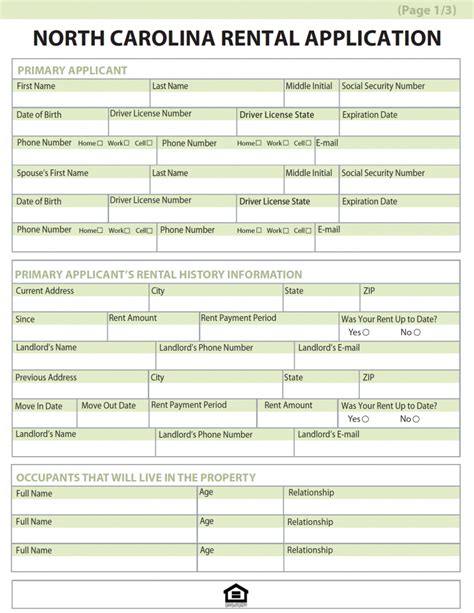Renting a property in North Carolina can be a daunting task, especially for first-time renters. With the state's growing popularity, the rental market has become increasingly competitive. To increase your chances of securing your dream rental property, it's essential to understand the North Carolina rental application process. In this article, we'll provide you with 8 essential tips to help you navigate the process successfully.
Understanding the North Carolina Rental Application Process
Before we dive into the tips, it's crucial to understand the overall rental application process in North Carolina. The process typically involves submitting an application, providing required documents, and waiting for the landlord's approval. The landlord will then review your application, check your credit score, and verify your employment and rental history.

Tip 1: Know Your Rights as a Renter
As a renter in North Carolina, it's essential to know your rights and responsibilities. The North Carolina Tenant Rights booklet provides an overview of the state's landlord-tenant laws. Understanding your rights will help you navigate the rental application process and avoid potential pitfalls.
Tip 2: Gather Required Documents
To increase your chances of approval, it's crucial to gather all required documents before submitting your application. These documents typically include:
- Identification (driver's license or passport)
- Proof of income (pay stubs or W-2 forms)
- Rental history (previous landlord references)
- Credit report (some landlords may require this)

Tip 3: Check Your Credit Score
Your credit score plays a significant role in the rental application process. A good credit score can increase your chances of approval, while a poor credit score can lead to rejection. Check your credit score before applying, and work on improving it if necessary.
Tip 4: Be Prepared for Fees
Rental applications often come with fees, such as application fees, security deposits, and pet deposits. Be prepared to pay these fees, and factor them into your budget.

Tip 5: Read the Lease Agreement Carefully
Before signing the lease agreement, read it carefully and ensure you understand all the terms and conditions. This includes the length of the lease, rent amount, and any rules or regulations.
Tip 6: Ask Questions
If you're unsure about any aspect of the rental application process or the lease agreement, ask questions. This is your opportunity to clarify any doubts and ensure you're making an informed decision.

Tip 7: Be Prepared for a Competitive Market
The rental market in North Carolina can be competitive, especially in popular cities like Raleigh and Charlotte. Be prepared to act quickly, and have all your documents ready to increase your chances of securing your dream rental property.
Tip 8: Seek Professional Help
If you're unsure about any aspect of the rental application process, consider seeking professional help. A real estate agent or property manager can guide you through the process and increase your chances of approval.

Gallery of North Carolina Rental Application






Frequently Asked Questions
What is the typical rental application process in North Carolina?
+The typical rental application process in North Carolina involves submitting an application, providing required documents, and waiting for the landlord's approval.
What documents are required for a rental application in North Carolina?
+The required documents for a rental application in North Carolina typically include identification, proof of income, rental history, and credit report.
How long does the rental application process take in North Carolina?
+The rental application process in North Carolina can take anywhere from a few days to several weeks, depending on the landlord and the complexity of the application.
We hope these 8 essential tips for the North Carolina rental application process have been helpful in guiding you through the process. Remember to stay informed, be prepared, and seek professional help when needed. Good luck with your rental application!
